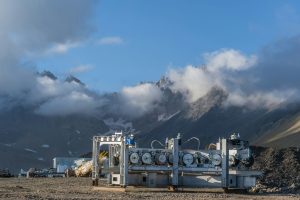Synthetic Fuel Development for Existing Combustion Engines
In recent years, there has been an increased focus on reducing carbon emissions and finding sustainable alternatives to traditional fuel sources. One promising solution that has been gaining traction is the development of synthetic fuels for existing combustion engines. These fuels, also known as synfuels, are produced using various chemical processes and can serve as a cleaner and more environmentally friendly option compared to traditional fossil fuels. In this article, we will explore the concept of synthetic fuel development for existing combustion engines and its potential impact on the future of transportation.
The Need for Synthetic Fuels
The burning of fossil fuels for transportation is a major contributor to greenhouse gas emissions and air pollution. With the constant growth of the global population and the increasing demand for transportation, it is evident that a shift towards cleaner and more sustainable fuel options is essential. While electric and hybrid vehicles have gained popularity in recent years, they are still limited in terms of range and availability of charging stations. This is where synthetic fuels come in, offering a viable solution for existing combustion engines to reduce their carbon footprint.
Understanding Synthetic Fuels
Synthetic fuels, also known as carbon-neutral or renewable fuels, are produced using various feedstocks such as natural gas, coal, biomass, and even carbon dioxide. These feedstocks are converted into liquid or gaseous fuels through chemical reactions, which are then used to power existing combustion engines. The most common synthetic fuels include methanol, biodiesel, and synthetic diesel.
One of the primary advantages of synthetic fuels is that they can be produced using a variety of feedstocks, making them flexible and adaptable to different markets. Additionally, they can also be blended with traditional fuels, reducing the need for a complete overhaul of existing transportation infrastructure.
The Challenges of Synthetic Fuel Development
Despite its potential benefits, the development and adoption of synthetic fuels face several challenges. One of the main obstacles is the high cost of production compared to traditional fuels. This is due to the complex and energy-intensive processes involved in synthesizing the fuels. However, with advancements in technology and economies of scale, experts predict that the cost of production will reduce significantly in the near future.
Furthermore, the production of synthetic fuels also requires a considerable amount of energy, and the source of this energy plays a crucial role in determining the overall carbon footprint of the fuel. While synthetic fuels produced using renewable energy sources can be completely carbon-neutral, those synthesized using fossil fuels will still emit carbon dioxide, albeit at a significantly lower rate compared to traditional fuels.
The Potential Impact of Synthetic Fuels
If effectively utilized, synthetic fuels have the potential to revolutionize the transportation sector. Unlike electric vehicles, which require a significant overhaul of the entire transportation infrastructure, synthetic fuels can be used in existing combustion engines, reducing the need for extensive investments. This means that synthetic fuels could be a more practical option for developing countries and remote areas with limited access to charging stations.
Additionally, as synthetic fuels undergo further research and development, they have the potential to become even more efficient and cleaner. This could result in a significant reduction in carbon emissions from the transportation sector, helping countries to meet their emission reduction targets and mitigate the adverse effects of climate change.
In Conclusion
Synthetic fuels offer an innovative and practical solution for reducing carbon emissions from the transportation sector. While the technology is still in its early stages, it has the potential to bridge the gap between traditional fossil fuels and electric vehicles. As the world shifts towards a greener future, the development and adoption of synthetic fuels could play a significant role in reducing our collective carbon footprint and creating a more sustainable future.










